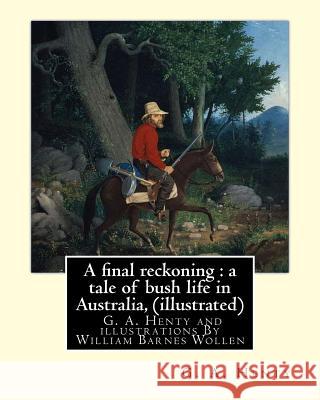A final reckoning: a tale of bush life in Australia, By G. A. Henty (illustrated): and illustrations By William Barnes Wollen (1857-1936) » książka
A final reckoning: a tale of bush life in Australia, By G. A. Henty (illustrated): and illustrations By William Barnes Wollen (1857-1936)
ISBN-13: 9781536851182 / Angielski / Miękka / 2016 / 158 str.
A final reckoning: a tale of bush life in Australia, By G. A. Henty (illustrated): and illustrations By William Barnes Wollen (1857-1936)
ISBN-13: 9781536851182 / Angielski / Miękka / 2016 / 158 str.
(netto: 36,11 VAT: 5%)
Najniższa cena z 30 dni: 37,81
ok. 16-18 dni roboczych
Dostawa w 2026 r.
Darmowa dostawa!
(Classic Fiction for Young Adults) An exciting adventure of outlaws in the early days of the Australian gold rush, when fortunes were made and stolen, and when bush rangers and natives constituted a real and formidable danger to the settlers. "All boys will read this story with eager and unflagging interest. William Barnes Wollen (1857-1936) was an English painter mostly known for his paintings of battle and historical scenes and sporting events.Born in Leipzig on 6 October 1857, he was educated at University College School, London from 1871-73 and also at the Slade School. From 1879 until 1922, he exhibited pictures at the Royal Academy, National Watercolour Society and elsewhere. His first picture exhibited at the Royal Academy was entitled "Football" but he followed this up with his first military painting in 1881 entitled "The rescue of Private Andrews by Captain Garnet J. Wolseley, H.M. 90th L.I. at the storming of the Motee Mahail, Lucknow." He was elected a member of the Royal Institute of Painters in Water Colours in 1888........... George Alfred Henty (8 December 1832 - 16 November 1902) was a prolific English novelist and war correspondent.He is best known for his historical adventure stories that were popular in the late 19th century. His works include The Dragon & The Raven (1886), For The Temple (1888), Under Drake's Flag (1883) and In Freedom's Cause (1885).G. A. Henty was born in Trumpington, near Cambridge. He was a sickly child who had to spend long periods in bed. During his frequent illnesses he became an avid reader and developed a wide range of interests which he carried into adulthood. He attended Westminster School, London, and later Gonville and Caius College, Cambridge, where he was a keen sportsman. He left the university early without completing his degree to volunteer for the Army Hospital Commissariat when the Crimean War began. He was sent to the Crimea and while there he witnessed the appalling conditions under which the British soldier had to fight. His letters home were filled with vivid descriptions of what he saw. His father was impressed by his letters and sent them to The Morning Advertiser newspaper which printed them. This initial writing success was a factor in Henty's later decision to accept the offer to become a special correspondent, the early name for journalists now better known as war correspondents. Shortly before resigning from the army as a captain in 1859 he married Elizabeth Finucane. The couple had four children. Elizabeth died in 1865 after a long illness and shortly after her death Henty began writing articles for the Standard newspaper. In 1866 the newspaper sent him as their special correspondent to report on the Austro-Italian War where he met Giuseppe Garibaldi. He went on to cover the 1868 British punitive expedition to Abyssinia, the Franco-Prussian War, the Ashanti War, the Carlist Rebellion in Spain and the Turco-Serbian War.He also witnessed the opening of the Suez Canal and travelled to Palestine, Russia and India. Henty was a strong supporter of the British Empire all his life; according to literary critic Kathryn Castle: "Henty...exemplified the ethos of the new imperialism, and glorified in its successes." Henty's ideas about politics were influenced by writers such as Sir Charles Dilke and Thomas Carlyle.Henty once related in an interview how his storytelling skills grew out of tales told after dinner to his children. He wrote his first children's book, Out on the Pampas in 1868, naming the book's main characters after his children. The book was published by Griffith and Farran in November 1870 with a title page date of 1871. ...
Zawartość książki może nie spełniać oczekiwań – reklamacje nie obejmują treści, która mogła nie być redakcyjnie ani merytorycznie opracowana.











